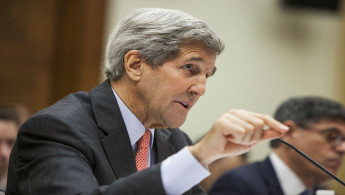Iran nuclear deal clears hurdles in US Congress
John Kerry announced on Wednesday that the Iran nuclear deal was safe from being blocked by Congress, which is scheduled to give its opinion on the deal before 17 September.
2 min read
US Secretary of State John Kerry announced that key Democrats support the deal [Anadolu]
The Iran nuclear deal now has enough support in the US Congress that opposition politicians will not be able to over-rule its approval, US Secretary of State John Kerry announced on Wednesday.
Speaking in Philadelphia, Kerry said that some rogue Democratic senators were convinced to back out of their makeshift alliance with Republicans in opposition to the deal.
The lynchpin of the turnaround is though to be Barbara Mikulski, the Democratic senator from Maryland who decided to support the deal on Wednesday.
With Mikulski's support, opposition to the deal in the Senate is now less than the two-thirds required by Republicans to over-ride a presidential veto of any Congressional rejection of the deal.
Wednesday's development does not mean that Congress will vote in favour of the deal, but means that Obama now has the power to prevent legislators from blocking the deal - considered a great political victory for Obama against Israel supporters from both parties.
The Iranian nuclear deal is scheduled to be the first item on the agenda when Congress reconvenes next week.
Congress is expected to vote against the deal, though only with a slim majority. The president is then likely to veto the rejection and sign the deal into law.
Republicans would then need the votes of 67 of 100 senators to over-ride the veto. Mikulski's turn-around means the pro-deal camp now numbers at least 34 senators - which in turn means the Republican count is down to 66.
Speaking in Philadelphia, Kerry said that some rogue Democratic senators were convinced to back out of their makeshift alliance with Republicans in opposition to the deal.
The lynchpin of the turnaround is though to be Barbara Mikulski, the Democratic senator from Maryland who decided to support the deal on Wednesday.
With Mikulski's support, opposition to the deal in the Senate is now less than the two-thirds required by Republicans to over-ride a presidential veto of any Congressional rejection of the deal.
Wednesday's development does not mean that Congress will vote in favour of the deal, but means that Obama now has the power to prevent legislators from blocking the deal - considered a great political victory for Obama against Israel supporters from both parties.
The Iranian nuclear deal is scheduled to be the first item on the agenda when Congress reconvenes next week.
Congress is expected to vote against the deal, though only with a slim majority. The president is then likely to veto the rejection and sign the deal into law.
Republicans would then need the votes of 67 of 100 senators to over-ride the veto. Mikulski's turn-around means the pro-deal camp now numbers at least 34 senators - which in turn means the Republican count is down to 66.





 Follow the Middle East's top stories in English at The New Arab on Google News
Follow the Middle East's top stories in English at The New Arab on Google News


![22 Arab countries at COP29 have rejected the targeting of fossil fuels [Getty]](/sites/default/files/styles/image_330x185/public/2024-11/GettyImages-2184289638.jpg?h=199d8c1f&itok=ptHl5bec)